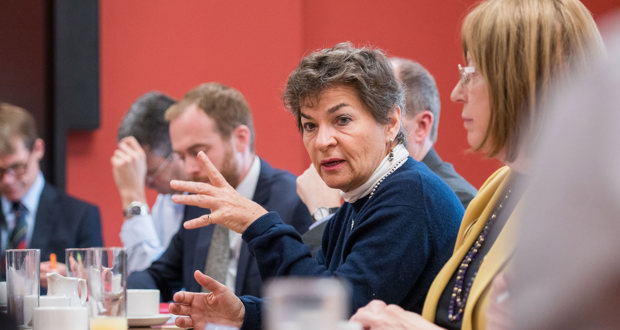01 November 2017

On 4 October 2017, Scotland’s 2020 Climate Group was proud to host a candid and open discussion about climate change with Christiana Figueres, former Executive Secretary of the UN Framework Convention on Climate Change, and an invited group of leading Scottish business people.
The 2020 Climate Group is a business-led initiative which provides leadership and stimulates collaboration towards meeting Scotland’s ambitious carbon reduction targets and sustainable economic development.
Participants included senior figures from CBI Scotland, Edinburgh Chamber of Commerce, Scottish Council for Development and Industry (SCDI), the Scottish Environment Protection Agency (SEPA) and Scottish Water, as well as businesses from a range of sectors: Buccleuch, Costain, Event Consultants Scotland, Green Investment Group, Mactaggart & Mickel, Natural Power, Panton McLeod, Royal Bank of Scotland, Royal Edinburgh Tattoo and Scottish Renewables.
It’s fair to say Ms Figueres had quite an impact on those present. While she stressed the need to lower greenhouse gas emissions by 6-7% per year from 2020, before global warming wreaks havoc on those most vulnerable to climate change, her message for businesses was positive: there are great opportunities as well as risks.
“Despite the United States coming out of the Paris Agreement, cities and companies in the US are decarbonising anyway,” she told us. “They can see the benefits to the economy.
“You can already see China, India and the EU moving into the vacuum left by Washington. India, China, Brazil, the EU will all go beyond what happens in the States. Addressing climate change offers so many benefits across so many sectors that everyone can find their place, whether it’s about getting more jobs or securing more investment.
“It’s amazing what’s happening around the world,” continued the woman who has just received the Shackleton Medal from the Royal Scottish Geographical Society, alongside Manuel Pulgar-Vidal and Laurent Fabius, for her role in the Paris Agreement to reduce greenhouse gas emissions.
“The cost of solar has come down 90% in the past few years. We are in the exponential age. The renewable electric matrix of the world is up from 4% to 23.7%. We’re investing heavily in storage which will allow a greater impact of renewables on the grid.
“On transport, the UK, France and India are moving from combustion engines to electric cars. China has begun its assessment of when it’s going to ban the combustion engine. In one day, General Motors announced they’d move to electric cars and Ford said they would put a team together to look into it too.
“Already, 90% of the biggest cities in the world have published their strategic deadline for delivering the Paris Agreement and it’s 2020. Big finance is moving in the right direction. Real change is possible.”
“What about Scotland?” we asked her.
“Scotland is a world leader in offshore renewables and you can be proud of that,” she told us. “We need to mainstream renewable energy and green finance. Where you see a politician who seems to understand climate change, support them. If she wants to do 5 say, ‘Yes, that’s great, why don’t we do 10?’
“What about SMEs?” someone persisted. “In your experience, when getting the message across, is it better to emphasise the risks or the opportunities? Which works best?”
“I believe in contextual messaging,” Ms Figueres stressed. “It depends on who you are talking to. In business you have to talk about the opportunities because the market forces are with us. I share risk but the focus is on opportunities.”
“I hadn’t thought about the opportunities of climate change,” admitted one, clearly-inspired attendee. “I had only thought about the risks.”
“The risks can seem overwhelming,” agreed another. “Giving positive messages as well as risks makes it seem more manageable.”
A third recalled: “Martin Luther King didn’t say, ‘I have a nightmare’, he said ‘I have a dream’.
There is a lot of good work happening on sustainability, circular economy and low carbon innovation among SMEs in Scotland. Sharing it, fostering radical collaboration, and encouraging others to come to the table is crucial. Scotland’s VIBES Awards are an excellent example of this in practice.
Lady Susan Rice, Chair of Scotland’s 2020 Climate Group, closed the meeting, thanking Christiana Figueres for her time and concluding:
“The message we need to keep in mind is the social imperative and the economic imperative will be delivered effectively if they become one, not two, thrusts. We have to get going, using contextual messaging, understanding who our audience is, making it clear to Scottish businesses that climate change isn’t an unsolvable negative – there‘s a great opportunity, a great chance to get this transition right and benefit everyone in the process. Decarbonisation may well become a great world unifier. And, for us, 2020 is just the beginning.”
Read more about Scotland’s 2020 Climate Group, including forthcoming events, at http://www.2020climategroup.org.uk/